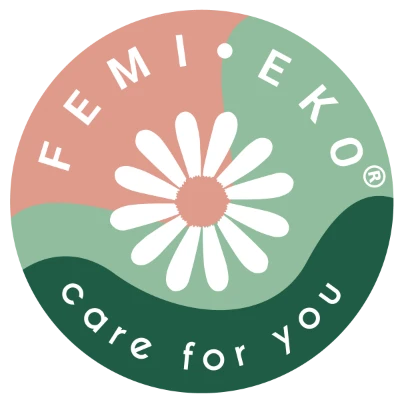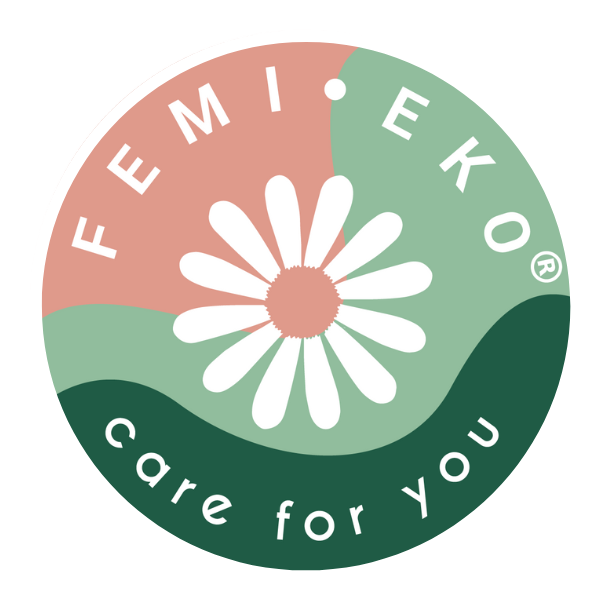Vi arver ikke jorden fra vores forfædre, vi låner den af vores børn.
Femi.Eko® elsker idéen om en sund krop og en lykkelig planet. Det guider os i alt, hvad vi gør, laver og siger. Vi udvikler holdbare menstruationsprodukter, der er behagelige og lækagesikre at have på. Vi stræber efter at forbedre vores forretningspraksis ved at tage os af kvinders behov og samtidig beskytte vores planet. Vi stræber efter at producere mindre affald og fremmer en "reducer og genbrug"-politik, fra vores emballage til vores produkter.
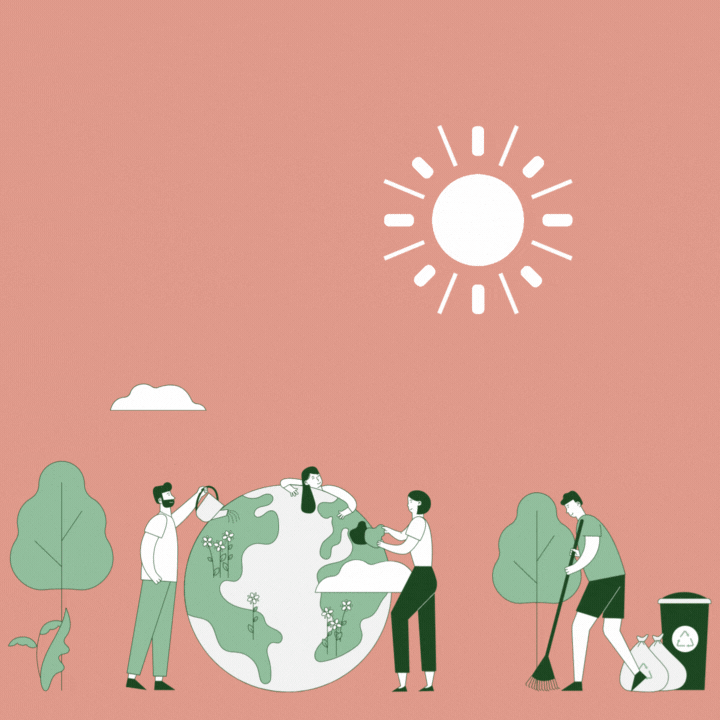
Omsorg for dig, omtanke for planeten.
Da ressourcerne er begrænsede, er vi klar over at vi skal bruge dem med omtanke og det er derfor, vi passer på hvert skridt vi tager på vores rejse: fra råmaterialer, fremstilling, transport, distribution til slutbrugeren og hvert produkts levetid. For os betyder det, at vi sætter spørgsmålstegn ved vores beslutninger og spørger os selv på hvert skridt af vejen: "Er det her virkelig nødvendigt? Hvem vil blive påvirket af det og hvornår?"
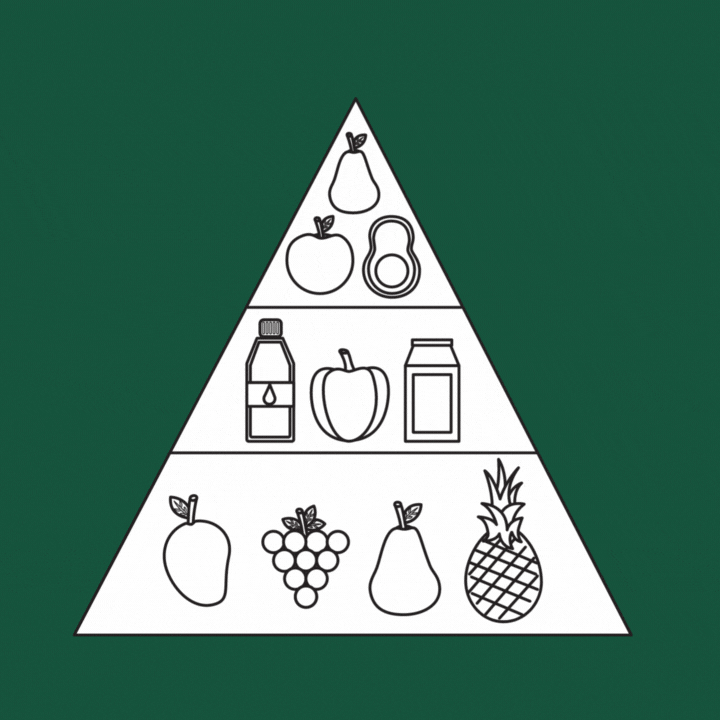
Kemikaliefri alternativer
Vores mål er at beskytte kvinders sundhed ved at vælge materialer, der er ugiftige og tager hensyn til kvindekroppens anatomi og det intime områdes følsomhed.
Vi tester og udvælger kun medicinsk godkendte faciliteter til vores produktion, lige fra kopper og diske il menstruationstrusser. Alle Femi.ekos produkter er testet og certificeret i henhold til den kvalitet, vi lover dig.
Alle vores produkter er moderne løsninger til beskyttelse ved menstruation og andre lækager. Beskyttelse som ikke forstyrrer den naturlige balance i intimområdet og ikke påvirker balancen i skedens flora og det reproduktive system, hvilket er en bæredygtig løsning for kvinders, teenageres og endda spædbørns sundhed.
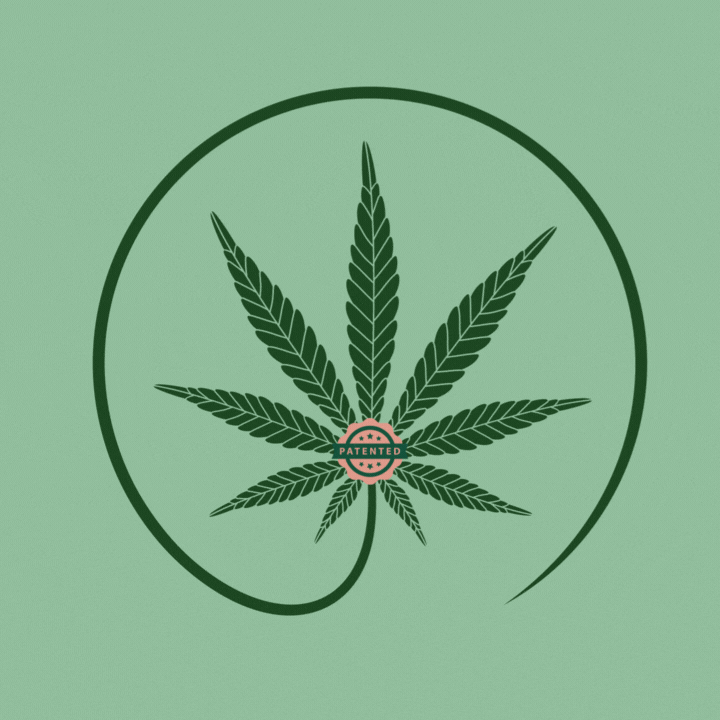
HAMP-antibakteriel teknologi
Femi.Eko's patenterede teknologi er baseret på beskyttende absorberende lag bestående af hamp garn i kombination med økologisk bomuld og andre naturlige tekstiler. Hvorfor vælger vi hamp frem for alle andre tekstiler? Fordi det er biologisk nedbrydeligt, godt for kroppen og bedre for planeten. Hamp er det mest bæredygtige materiale, fra produktion til brug: det omstrukturerer jorden, er CO2-negativt og kræver ikke så meget vand at dyrke. Hamp har en kort væksttid - kun 3 måneder - og kræver ikke pesticider eller andre kemiske processer til dyrkning og produktion. Når det bæres, har det adskillige egenskaber, der gavner den intime balance: det er absorberende, antibakterielt, allergivenligt, fugtregulerende, lugthæmmende, termoregulerende, åndbart, holdbart, kemikaliefrit, biologisk nedbrydeligt og bæredygtigt, og kaldes også "vegansk uld".
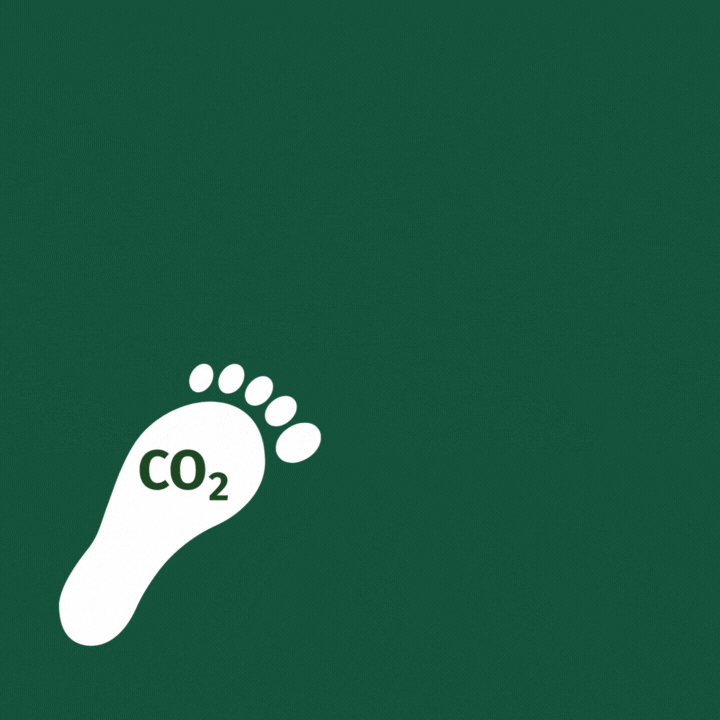
Vores produktion
Vi vælger vores partnere med omhu og søger konstant efter leverandører med bæredygtige certificeringer, samtidig med at vi forsøger at støtte lokale produktionslinjer så meget som muligt.
Nogle af vores produkter er fremstillet i Asien, andre er fremstillet i Europa, og dette vil altid være angivet på kassen eller på selve produktet, så de er sporbare og gennemsigtige.
Alle vores produktionsprocesser er designet og udvalgt for at reducere det økologiske fodaftryk og energiforbruget. Vi vælger produktionsfaciliteter, der har integrerede vandrensningssystemer, kontrollerer deres gasudledninger og bruger biomasse til at producere varmt vand og varme. Derudover, når vi taler om leverandører og partnere, leder vi efter enhver genanvendelig energi, der bruger solpaneler og endda elektriske køretøjer.
En anden vigtig faktor er brugen af økologiske materialer, der ikke forurener jorden, vandet og de mennesker, der arbejder med dem.
Vi bruger genanvendte stoffer i mange af vores kollektioner for at støtte en genanvendelig cyklus af vores ressourcer - for eksempel badetøjskollektionerne. Femi.Eko vil konstant udvide sit produktsortiment med det formål at imødekomme alle kvinders behov, men altid med fokus på den EKO.logiske faktor.
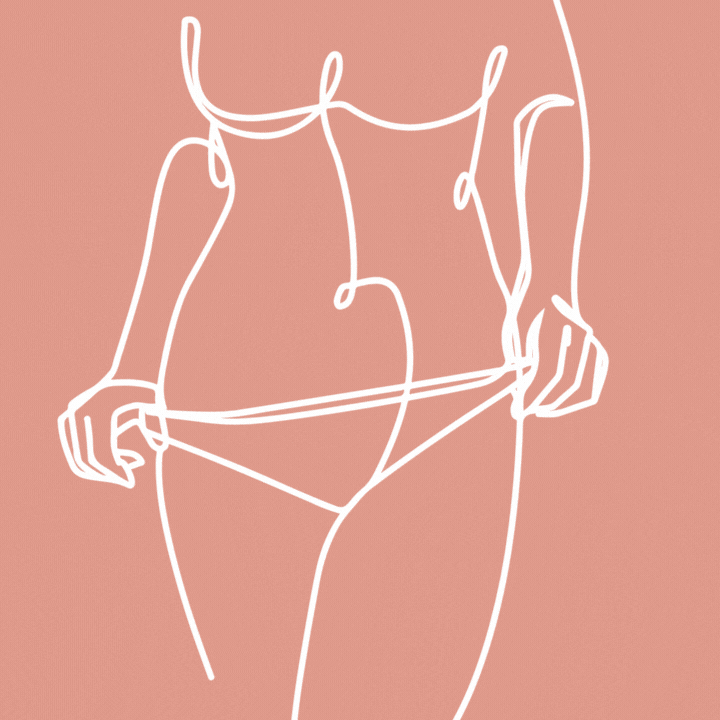
Emballage
Alle vores produkter er pakket i FSC-kasser og har ingen plastbelægning og er fuldt genanvendelige. Vores menstruationsundertøj har en hygiejnisk beskyttelse, der er biologisk nedbrydelig og vi bruger ikke ekstra etiketter og indlæg. Vi leverer vores pakker i bionedbrydelige poser lavet af majsstivelse eller i FSC-papemballage, som er fuldstændig genanvendelig. For at undgå unødvendigt emballageaffald har vi fundet på en innovativ metode til at levere ordrer med mere end 3 par menstruationstrusser. Hvis du vælger vores smukke Naked Box, leverer vi dit menstruationsundertøj i løs vægt, uden at du får unødvendig emballage med, som alligevel ville være endt i skraldespanden.
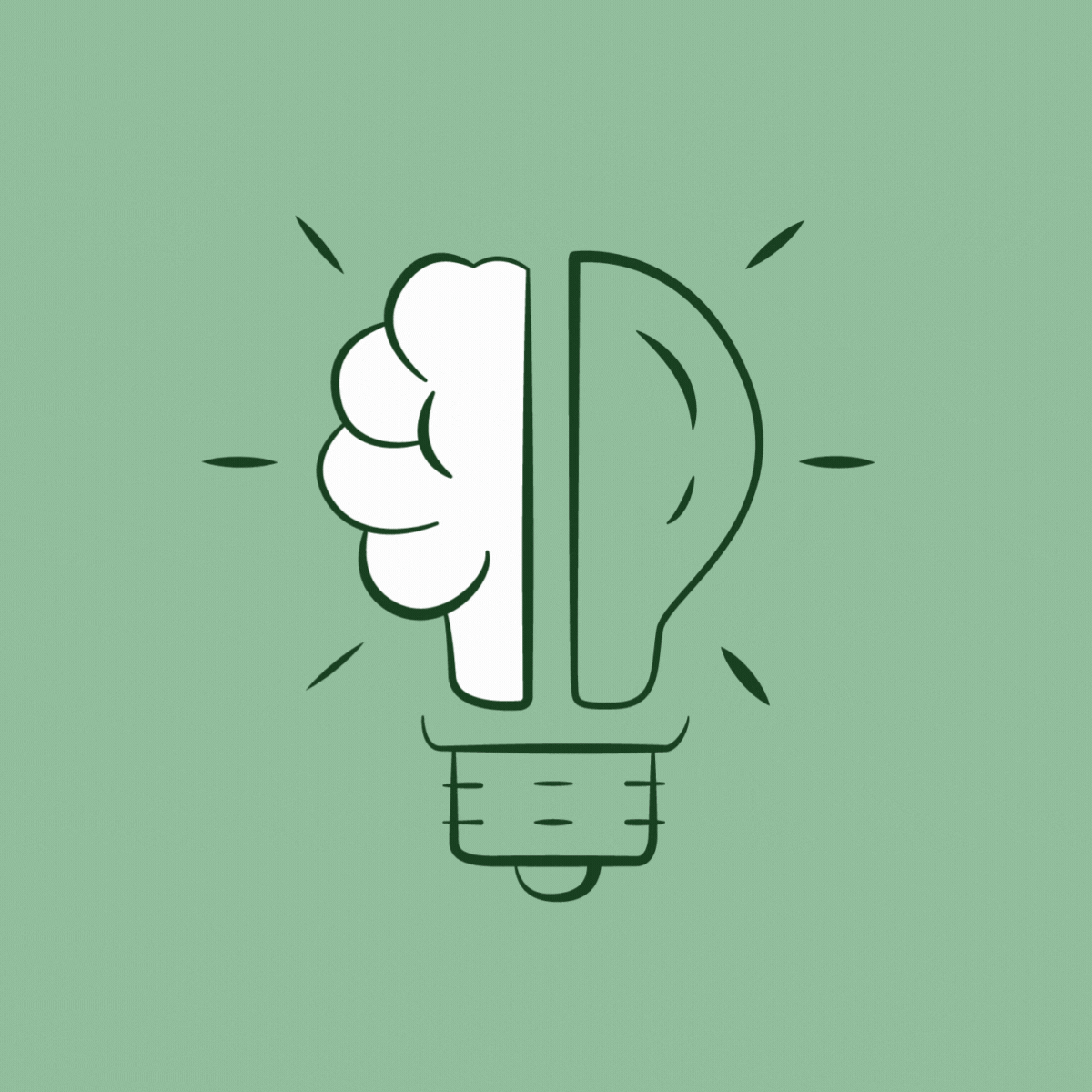
Uddannelse
En bæredygtig verden kræver individuelle og kollektive handlinger både i lokale og globale samfund. Vi mener, det er vores ansvar at lære folk at respektere vores økosystemers skrøbelighed og forstå, at handlinger har konsekvenser og kan ødelægge eller opbygge et sikkert sted for fremtidige generationer.
Vi ønsker at takke alle, der aktivt deltager i køb af genanvendelige produkter, og vi vil minde om, at bevidste indkøb, genbrug og endda vask i koldt vand sammen med andre tøj eller tørring på tørresnor kan reducere vand- og energispild.
Vores mål er at øge bevidstheden om dette virkelige moderne problem ved at informere folk, især unge, om at selv små handlinger kan have en positiv indvirkning på global opvarmning, forurening og fremtiden for vores planet.

CO2-aftryk
Ved blot at skifte fra engangsartikler til genanvendelige artikler kan hver kvinde reducere CO2-produktionen og affaldet massivt. Fra råmaterialer til livscyklussen for hvert produkt repræsenterer genanvendelige produkter et levedygtigt alternativ for det moderne samfund til at bekæmpe forurening og global opvarmning.
Fordi det ikke er nok bare at tænke, men vi skal handle positivt, har vi indgået et partnerskab med Trees For the Future for aktivt at bidrage til planetens fremtid. For hvert produkt, du køber fra Femieko, plantes der et træ, og der oprettes en gård for kvinder i Afrika, så de kan blive uafhængige og forsørge deres familier.
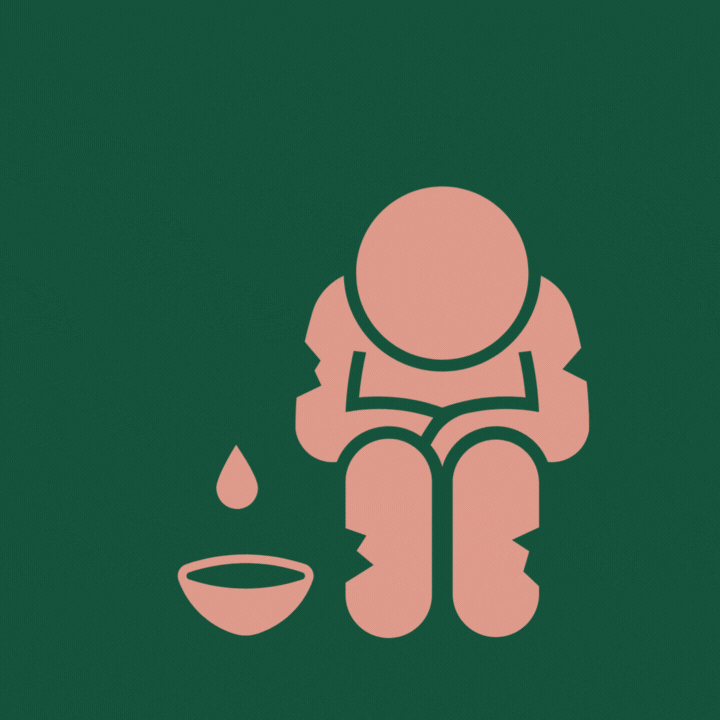
Period Poverty
Det engelske udtryk "Period Poverty" definerer et globalt problem, der berører personer, der ikke har adgang til sanitære produkter, uddannelse, faciliteter eller affaldshåndtering, som de har brug for i forbindelse med deres menstruationscyklus. Dette kan forårsage mentale og fysiske sundhedsproblemer samt stigmatisering og social eksklusion. Menstruationsprodukter betragtes ofte som luksusartikler og beskattes derefter, hvilket gør dem utilgængelige for unge piger og kvinder i alle aldre. Nogle steder har vedtaget love for at tilbyde gratis menstruationsprodukter i skoler eller fængsler, men der skal gøres mere arbejde på dette område.
I vores bestræbelser på at skabe produkter, der er både overkommelige og inkluderende, ønsker vi at sætte en stopper for menstruationsfattigdom og menstruationsstigma, som er ansvarlig for mange kvindeproblemer, såsom fravær fra skole og arbejde eller endda selvtillid.
Men vores arbejde stopper ikke her. Vi har indgået et partnerskab med Bedre syn til Africa, hvor vi leverer menstruationskopper, genanvendelige bind og menstruationsundertøj til deres uddannelsesaktiviteter om reproduktionssystemet og bekæmpelse af menstruationsfattigdom i Afrika.
Tilmeld dig vores e-breve
Oplev vores månedlige bevægelser.



